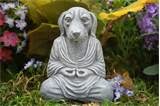 |
| ZCLA Gateless Gate entrance, residential area near Wilshire district (Wisdom Quarterly) |
 |
| Boy mesmerized by baby Siddhartha (ZCLA) |
Join in celebrating the birth of the Buddha, and all of the baby future buddhas, in the Zen Center garden. A small arbor house decorated with flowers will be erected, and Dokai Dickenson will officiate the special service. Afterwards, the Birth Story of the Buddha and his first steps in the world will be told.
 |
| Birth of the Bodhisattva |
Everyone is invited to bring a small bouquet of flowers as an offering for the service. Children, friends, and family are all welcome. The Sunday schedule will include a chanting service, sitting meditation (zazen), and a celebration of the Buddha’s birthday, followed by a light lunch. Plan on arriving at ZCLA by 8:15 am to get a parking space and be ready for the Sunday schedule:
- 8:30am-9:00am Chanting Service – The Gate of Sweet Nectar (please bring a can of food for the altar offering to help local needy families)
- 9:00-9:35 Zazen (silent seated meditation)
- 9:35-9:45 Kinhin (walking meditation)
- 9:45-10:20 Zazen (silent seated meditation)
- 11:00-12 noon Buddha’s Birthday Celebration in the garden
- 12:15-12:45 Snack
 |
| Lunch during sesshin, ZCLA dining hall, main building next to gift shop (zencenter.org) |
 If driving, make sure to arrive at ZCLA early, as parking is at a premium. Attend any or all of the activities, and leave at any of the activity change breaks, or stay until the end (about 12:45 pm) for lunch.
If driving, make sure to arrive at ZCLA early, as parking is at a premium. Attend any or all of the activities, and leave at any of the activity change breaks, or stay until the end (about 12:45 pm) for lunch.Please wear loose, comfortable clothing, preferably dark in color, with no distracting colors or logos. Please refrain from wearing excessive jewelry, perfume, or cologne. Participation is FREE. Donations at the Center are accepted. The ZCLA bookstore will be open for books, incense, and meditation cushions.
Zen Center of Los Angeles
 |
| Secondary rear meeting room (WQ) |
The Center was founded in 1967 by Taizan Maezumi Roshi. ZCLA Buddha Essence Temple has provided the teachings and practice of Zen Buddhism to all who come and go through its temple gate. Its mission is to know the self, maintain the precepts, and serve others. It serves by providing the Dharma, training, and transmission of Soto Zen Buddhism. Its vision is an "enlightened world" in which suffering is transcended, all beings live in harmony, everyone has enough, deep wisdom is realized, and compassion flows unhindered.
The Center affirms its intention to honor diversity and actively welcome all people, regardless of religion, age, ethnicity, gender, physical or mental ability, race, sexual orientation, or socio-economic background.
ZCLA observes a daily schedule of zazen, Buddhist services, and mindful work. The Center's programs include introductory classes, sesshin, workshops, and training periods, as well as face-to-face meetings with Abbot Wendy Egyoku Nakao and other Center teachers. The practice of zazen and koan training is in the Maezumi-Glassman lineage.



















